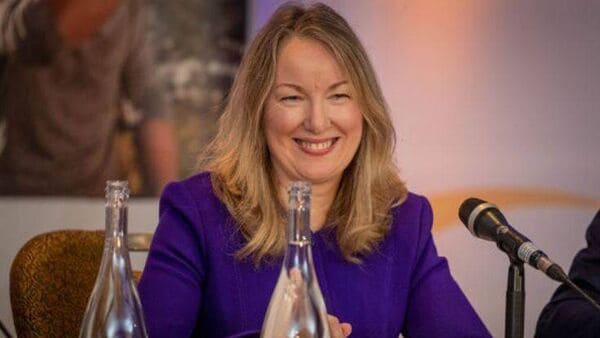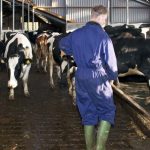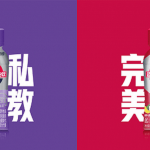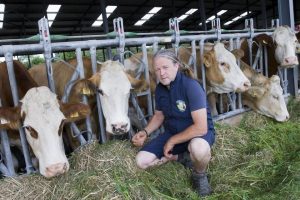
Glanbia has made the breakthrough into the Global Dairy Top 20 compiled by Rabobank.
Its arrival into the prestigious list is a fitting tribute to chief executive Siobhán Talbot, who is retiring from the company after a decade in charge. Hugh McGuire, currently serving as the CEO of Glanbia Performance Nutrition, will take over her position.
According to Rabobank analysts, Glanbia’s Top 20 debut came as the company benefited from increasing sales in US dollars. “The majority of Glanbia’s revenues are derived from sales in the US, and the company recently announced that it will switch to reporting in US dollars instead of in euros in the near future”.
The dollar’s strength in 2022 contributed significantly to a reshuffle of the Top 20, with particularly unfavourable annual results for dairy companies reporting in euros, New Zealand dollars, renminbi, and yen.
The Top 20 debut for Glanbia came in the year it formalised its split from Glanbia Ireland, by selling its 40% shareholding to Glanbia Co-operative Society. The Irish dairy business, including the Co-op, has rebranded as Tirlán, which remains the largest shareholder in Glanbia PLC.
Two other big developments for Glanbia in the past year were acquiring Sterling Technologies in the US, and selling its stake in the Glanbia Cheese (mozzarella) joint venture to partner Leprino Foods, earlier this year. Cheese and nutritional products remain the main business segments for Glanbia.
Companies are ranked in the Top 20 on the basis of dairy turnover in 2022, with Glanbia’s $5.1bn raising it to No 20, not too far behind the Froneri ($5.3bn) ice-cream, frozen food and chilled dairy company in the UK.
Next come DMK in Germany ($5.5bn) at No 18, and Sodiaal in France ($5.8bn) at No 17. Other big players to make the list include Unilever ($8.3bn), based in the Netherlands and UK; the Gujarat Cooperative Milk Marketing Federation Ltd ($7bn) in India; Müller ($6.5bn) in Germany; Arla Foods based in Denmark and Sweden ($14.5bn); FrieslandCampina in the Netherlands ($14.4bn); Mengniu in China (also $14.4bn); Fonterra in New Zealand ($14.2bn); and Saputo in Canada ($13.7bn); Danone in France ($21.2bn); Nestlé in Switzerland ($23.3bn); Dairy Farmers of America ($24.5bn); with Lactalis of France retaining its No 1 position with a 2022 turnover of $28.6bn.
Rising turnover… but also rising costs
The combined turnover of the Global Dairy Top 20 companies jumped by 7.4% in US dollar terms, following the prior year’s gain of 9.3%. In euro terms, the combined turnover increased by 21% due to the combination of a stronger US dollar, inflation, and tight market conditions during most of 2022, with many companies reporting record-high revenues in their local currencies.
In 2022, merger and acquisition activity was nearly on par with the prior year, with almost 25 deals.
Rabobank said that in 2022, a second round of war-induced inflation rallied EU dairy product prices to record average highs. In Oceania and the US, milk powder prices were elevated but didn’t exceed 2013’s record levels. At the same time, lower-than-anticipated milk production growth and decent domestic demand in the main exporting regions contributed to an overall tight dairy market, with limited exportable surpluses.
“In the end, most revenue gains were absorbed by exploding costs, leaving little left on the companies’ bottom lines. Many dairy companies paid record-high average farmgate milk prices to offset large farm input costs.
“At the factory gate, rising energy costs and the availability of natural gas, especially in Europe, were the largest concerns, as dairy processing is an energy-intensive process.”
The pressure on milk supply in Oceania and Europe led to a streak of factory closures and disposals. For example, FrieslandCampina closed several production facilities in the Netherlands.
Rabobank analysts predicted that weakening dairy and retail prices will make 2023 a challenging year for profitability, with some companies unlikely to match the double-digit percentage revenue gains they experienced in 2022.
An impressive 20.5% jump in turnover pushed Lactalis further ahead at No 1 in 2022, with strong growth underpinned by several large recent acquisitions, organic growth, and inflated dairy commodity prices.
But Dairy Farmers of America had the biggest turnover gain of the 20, soaring 26.9% in dollar terms in 2022. This was primarily due to elevated dairy product prices and organic growth.
Nestlé still holds a large (non-controlling) equity share in the Froneri ice cream company at No 19.
Pending deals for Danone include the disposal of a minority share (37%) in Irish yoghurt company Glenisk Organic Dairy. But Moscow’s announcement to take control of Danone’s Russian business is a setback. Danone indicates Russia has been its fifth-largest sales contributor.
Rabobank analysts noted that dairy alternatives have become part of the product portfolio of most Dairy Top 20 companies, but still account for a small share of revenues. Attention has shifted towards precision fermentation to develop alternatives for dairy proteins, and away from plant-based alternatives to liquid milk and fresh products like yoghurt.




















